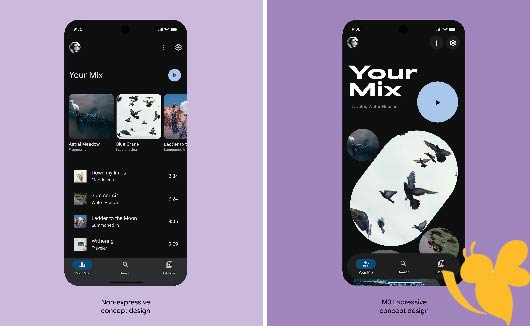In a recent incident, Google inadvertently disclosed details regarding its forthcoming Material 3 Expressive design language, intended for the Android ecosystem. This information emerged from a now-removed blog post and was corroborated by various reports . The design emphasizes "expressive" elements characterized by bold shapes and vibrant colors aimed at fostering emotionally engaging user interfaces. While the update builds upon the existing Material You framework, it is not an extensive overhaul but rather an enhancement of usability features particularly beneficial for older adults .
The research underpinning Material 3 Expressive is noteworthy; it involved 46 rounds of testing with over 18,000 participants . Findings indicated that users could identify key elements significantly faster than with the existing Material Design. Moreover, usability improvements were particularly pronounced among users aged over 45 years. This extensive research underscores Google's commitment to creating designs that resonate across various age groups while acknowledging that expressive design may not universally suit all applications or platforms.
Design system updates significantly impact Android app development and user experience.
Though specifics remain scarce, Material 3 Expressive promises "bold use of shape and color" for delightful user experiences. This builds upon Material Design, Google's open-source system launched in 2014 that guides Android UI creation across visual, motion, and interaction design. Its previous major update, Material You (also Material 3) in 2021, introduced adaptive interfaces enabling wallpaper-based personalization of the Android experience.
In addition to aesthetic changes, the leak revealed several practical updates within Android's interface. Notable modifications include redesigned icons and an updated quick settings menu aimed at streamlining user interaction . However, challenges remain in terms of adoption rates among different device manufacturers. While Google Pixel devices will fully embrace this new design language, other OEMs like Samsung and OnePlus may only implement aspects of it or choose not to adopt it altogether due to potential legal complications surrounding Google's contractual agreements . Overall, despite these hurdles, Material 3 Expressive represents a significant step forward in Android's evolution towards more inclusive and engaging user experiences.
Expect more M3 Expressive details closer to Google I/O. However, insights into Google's design research don't guarantee immediate Android implementation. As with the original Material Design, adoption will likely be gradual, first in apps, then in the OS. These transitions take time.
Read more
Islanders win NHL draft lottery, claim No. 1 pick Altman gives Musk a win, abandoning Open AI's for-profit ambitionsSarah H
Also on site :
- Watch As A Tesla Robotaxi Repeatedly Tries To Swerve Into The Wrong Lane
- TeamGroup T-Force DARK AirFlow 1 SSD Cooler Review – Handling Gen5 Like A Boss
- Samsung Estimated To Introduce A 16GB RAM Upgrade To Its Galaxy S26 Series In 2026, Claims Research Firm, While Apple’s iPhone Range Will Remain Unchanged In These Specifications

